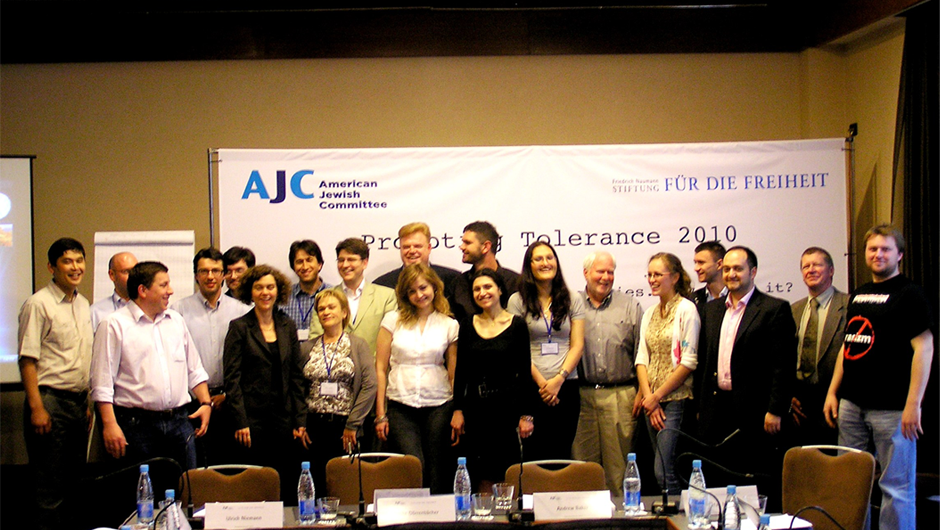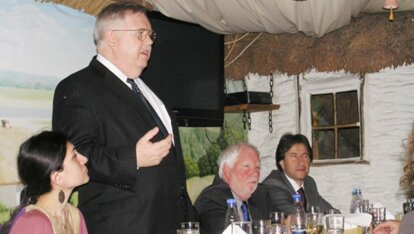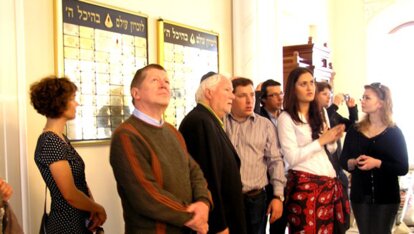The “Promoting Tolerance Programme 2010” in Kiev: Liberal Approaches

The participants in the live seminar of ''Promoting Tolerance 2010'' in Kiev
For the 18th time, the Friedrich Naumann Foundation for Freedom (FNF) and the American Jewish Committee (AJC) sent out invitations for participation in the "International Promoting Tolerance Programme". Since 1992, the FNF and the AJC have supported this programme series on democracy-building and the promotion of tolerance for young political and civil society professionals from Eastern Europe and neighbouring regions.
After they successfully concluded the online preparatory phase, 14 participants from Russia, Ukraine, Central Asia, Caucasus and Central & Southeast Europe travelled to Kiev during the end of May 2010 to participate in a live seminar skilfully moderated by Stefan Melnik - "Promoting multi-ethnic societies. How to do it? ". These young political, business and NGO leaders discussed several issues: civil and minority rights in their home countries, possible policy approaches to solving ethnic, cultural and religious conflicts, and the future of the multi-ethnic state in Europe. Alumni representatives from prior programmes contributed interesting proposals for concrete approaches to conflict prevention and minority issues.

The participant from Georgia Shorena Lortkipanidze, new U.S. ambassador to Ukraine, John F. Tefft, Rabbi Andrew Baker from American Jewish Committee and Korman Ismailov, Member of Bulgarian Parliament at the official reception, from left to right
The selection of Kiev as the Programme's venue was apt since the city proved to be a fitting backdrop for an event promoting tolerance. The cultures of different ethnic and religious minorities have left clear marks on Kiev which are still present. These could be experienced by the seminar participants themselves during a city tour. Ukraine has had a highly varied history of inter-ethnic and inter-religious relations, the results of which are still felt in today's political discourse. Fortunately, despite the existing potential for conflict, the Ukrainian government has so far managed to prevent the kind of multi-ethnic clashes seen in some European countries. Ukrainian participants presented their country's recent policies as a feasible strategy for conflict prevention in other nations.
After intense and sometimes emotional discussions, the participants agreed that respect, recognition and cooperation practiced in daily life are an important precondition for tolerance towards other nationalities, ethnicities and religions. Moreover, it is the building of a democratic constitutional state and the development of a strong civil society that are the necessary preconditions for peaceful coexistence in a multi-ethnic society.

Visiting the Jewish Synagogue in Kiev
The participants' next task is to actively introduce the approaches they discussed into the decision-making process of their home countries' liberal organizations. In this way, the "Promoting Tolerance Programme" can make an important contribution towards encouraging tolerance and integration in the countries of Central, South-Eastern, and Eastern Europe, South Caucasus and Central Asia.
At an official reception, the Programme's political significance was recognized by appreciative words from the new U.S. ambassador to Ukraine, John F. Tefft and the Deputy German Ambassador, Susanne Schütz.
In November, this year's "Promoting Tolerance Programme" will proceed to its third phase, a study trip to the U.S.. By their visits to many U.S. cities, the participants should gain a better understanding of how America has promoted the coexistence and integration of minorities.
Neli Kaloyanova